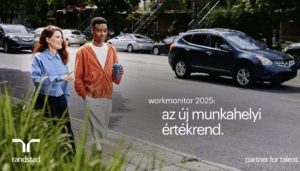A new set of employee values is taking shape – or what does a “good workplace” mean today?
Randstad’s Workmonitor 2025 provides a comprehensive picture of how employees’ relationship with work is shifting – globally and in Hungary. Based on the opinions of over 26,000 employees, the report redefines what people expect from their jobs around three key questions: why we work, who we work with, and how we work. The findings make it clear: salary is no longer the primary driver – personal values, community, and flexibility now take center stage.
Personalization is the top motivator
 A growing majority of employees want to work in environments aligned with their personal values, ambitions, and life circumstances – not just financially. For the first time in Workmonitor history, work–life balance has overtaken pay as the top motivational factor (83% globally, 87% in Hungary). Nearly half of respondents would not accept a job offer from a company whose social or environmental values conflict with their own – in Hungary, this rate is 42%.
A growing majority of employees want to work in environments aligned with their personal values, ambitions, and life circumstances – not just financially. For the first time in Workmonitor history, work–life balance has overtaken pay as the top motivational factor (83% globally, 87% in Hungary). Nearly half of respondents would not accept a job offer from a company whose social or environmental values conflict with their own – in Hungary, this rate is 42%.
Lack of career growth is also a key reason for job changes: 24% of Hungarian workers have quit a job due to this, and 28% have left because they disagreed with their company’s leadership values.
Belonging matters more than ever
More than half of respondents said they would leave a job if they didn’t feel a sense of belonging – up from 33% to 53% in Hungary in just one year. Among Gen Z, 84% want to feel part of a workplace community, not just part of a workforce.
The value of friendships and human connections at work has increased: one-third of respondents – 32% in Hungary – would accept lower pay in exchange for working with people they consider close friends.
Skills development is a deal breaker
Continuous learning is now a baseline expectation. In Hungary, 37% would not accept a job without relevant upskilling opportunities, and 33% have already resigned due to a lack of learning and development options. Two-thirds of employees believe employers are responsible for providing future-proof training, but only 9% of coaching programs are accessible to everyone.
Technological advancement – especially AI – has made skills development urgent. Here again, Gen Z stands out as the most active and aware demographic.
Flexibility is no longer a perk – it’s a standard
Globally, flexibility in where and when people work has become more common (60% say they can choose where to work), but Hungary still lags behind, with only half of employees reporting similar freedom. A gap remains between employer expectations and employees’ preferred hybrid working arrangements.
Employers can no longer ignore these shifts
Workmonitor 2025 makes one thing clear: employees are willing to walk away if their workplace fails to meet their expectations – whether that’s in terms of values, flexibility, community, or fairness. The report shows that trust, individualized support, and a sense of belonging all contribute to more productive and committed workplaces – and that’s not just good HR, it’s good business.
Related news
Péter Oszkó also sees the future in the Hungarian labor market
🎧 Hallgasd a cikket: Lejátszás Szünet Folytatás Leállítás Nyelv: Auto…
Read more >New EU study examines gender differences in deep tech investments
🎧 Hallgasd a cikket: Lejátszás Szünet Folytatás Leállítás Nyelv: Auto…
Read more >Related news
II. Green Gastronomy – Marketing Communication Workshop organized by the MMSZ HoReCa and Green Section
🎧 Hallgasd a cikket: Lejátszás Szünet Folytatás Leállítás Nyelv: Auto…
Read more >







